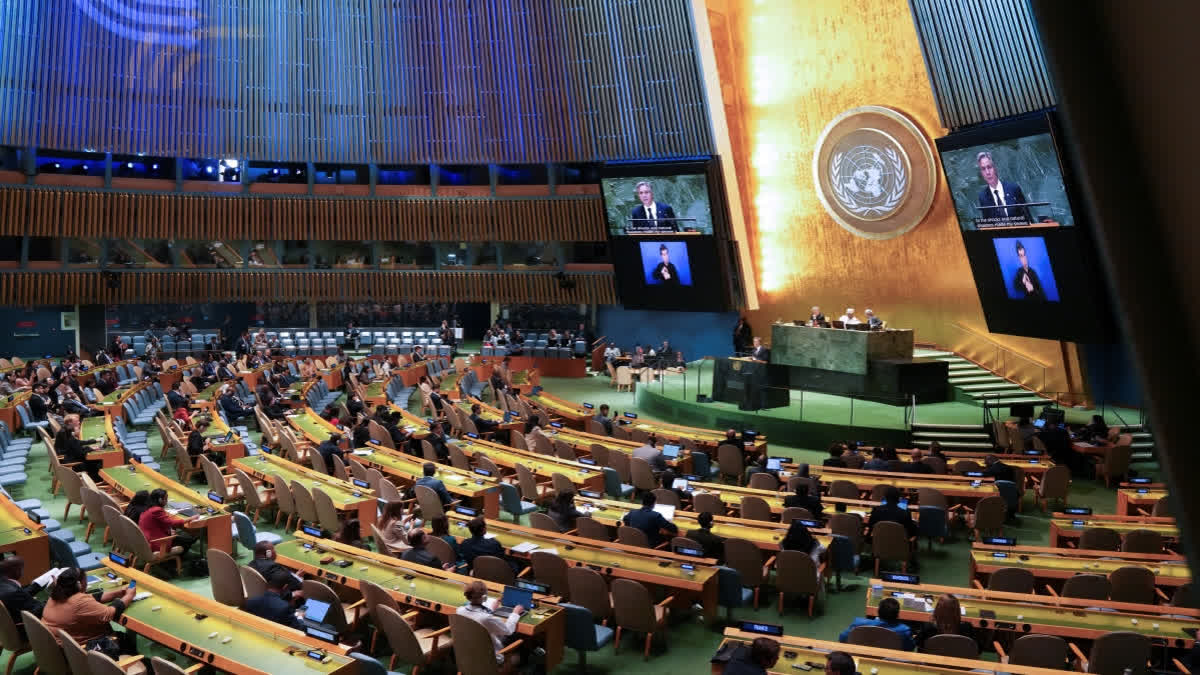United Nations: The United States said it remains concerned about terror group ISIS-Khorasan’s (ISIS-K) capabilities to plot, conduct attacks and sustain recruitment campaigns, particularly in Afghanistan and Pakistan.
These remarks were made at the Security Council by Ambassador Dorothy Shea, Charge d'Affaires ad interim at the US Mission to the UN in her briefing on ‘Threats to International Peace and Security by Terrorist Acts.’
Shea also said "Countering ISIS and other terrorist groups around the world is a top priority for the Trump administration...President Trump’s message is clear: The United States always stands ready to find and eliminate terrorists who threaten the United States and our allies."
She noted that ISIS affiliates in Central Asia, most notably ISIS-Khorasan, also pose a significant global threat. “We remain concerned about ISIS-K's capabilities to plot and conduct attacks, as well as sustain recruitment campaigns, particularly in Afghanistan and Pakistan,” she said.
In his remarks to the briefing, Under-Secretary-General United Nations Office of Counter-Terrorism Vladimir Voronkov said that ISIL-K continued to pose a significant threat in Afghanistan, the region and beyond.
He said that in addition to attacks in Afghanistan, ISIL-K supporters plotted attacks in Europe and were actively seeking to recruit individuals from Central Asian States. "There were also reports of small numbers of foreign terrorist fighters continuing to travel to Afghanistan,” Voronkov said.
Voronkov recalled Secretary-General Antonio Guterres' "appeal to all member states to unite to prevent Afghanistan from again becoming a hotbed of terrorist activities."
In her remarks, Executive Director at the Counter-Terrorism Committee Executive Directorate (CTED), Assistant Secretary-General Natalia Gherman said that beyond the Middle East, “Da’esh remains agile, taking advantage of ongoing conflicts and regions experiencing growing instability.”
Significantly, in her remarks Gherman also referred to the ‘Delhi Declaration’ that was adopted during India's 2021-22 tenure in the Security Council on countering the use of new and emerging technologies for terrorist purposes.
"As mandated by the Delhi Declaration, the Counter-Terrorism Committee just last month adopted the non-binding guiding principles on “preventing, detecting and disrupting the use of new and emerging financial technologies for terrorist purposes", also known as the 'Algeria Guiding Principles',” she said.
The guiding principles have been prepared with the support of the CTED, highlight the importance of a comprehensive and risk-based approach, and provide practical guidance to Member States, Gherman added.
In October 2022, the Security Council Counter-Terrorism Committee (CTC), chaired by India that year, organised a Special Meeting in New Delhi and Mumbai on the overarching theme of ‘Countering the use of new and emerging technologies for terrorist purposes’.
As an outcome of the special meeting, the Committee adopted the ‘Delhi Declaration’ on countering the use of new and emerging technologies for terrorist purposes. India, during its 2021-22 tenure as a non-permanent member of the UN Security Council, had assumed the chair of the CTC in 2022.
The meeting of UNSC CTC took place on October 28 in Hotel Taj Mahal Palace in Mumbai, the site of the horrific 26/11 Mumbai attacks and in Delhi on October 29, where the Delhi Declaration was agreed upon.
Shea added that ISIS has expanded the frequency and lethality of its attacks in the Sahel, making this region the global epicentre for fatalities from terrorist attacks. As such, ISIS-Somalia, ISIS-Sahel, and ISIS-West Africa collectively pose a significant threat to stability and prosperity in Africa.
She asserted that accountability for terrorist attacks and other terrorist activity is key to the fight against terrorism and to deterring such acts from taking place in the future. “In that vein, we urge the members of this Council to take action and agree to list more ISIL and al-Qa'ida affiliates in the 1267 Sanctions Committee, so that they will be subject to a worldwide asset freeze, travel ban, and arms embargo.”
The US also called on Member States to play an active and timely role in updating and implementing UN 1267 sanctions to counter ISIS and al-Qa'ida.“Money is the lifeblood of terrorists. We must bolster our collective efforts to stem the flow of funds to terrorists and terrorist groups,” she said.
Voronkov further said that the terrorism landscape is evolving and demands collective, multilateral action, as terrorist attacks threaten life, well-being and the fundamental rights and freedoms of individuals.
He voiced concern that despite steady counter-terrorism efforts by Member States, and international and regional partners, Da’esh continues to demonstrate resilience and adapt its modus operandi.
He added that the resilience of terrorist groups underscores the need for sustained international collaboration. Member States must prioritise comprehensive, long-term responses that address the conditions conducive to terrorism while strengthening the rule of law and upholding international human rights and humanitarian law.
“Terrorism remains a significant and evolving threat to global peace and security, one that no State can confront in isolation. Sustained multilateral cooperation remains essential to countering terrorism effectively,” Voronkov said.



